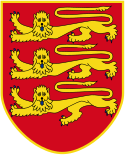| Politics of Jersey |
|---|
 |
| Category |
Elections were held in Jersey on 30 August 1940. The island was occupied by the Germans from 1 July 1940 until the surrender of the German forces on 9 May 1945. During this time, there was one election, held soon after the occupation began. The result installed puppet leader Edward Campbell as a front for the German administration, which was centered around the department of Manche, a French department in Normandy. [1] Also standing was Thomas Jenkins. [2]
The election was unique in that only two candidates stood to represent the entire island. [2] The post voted for was short-lived, and the Nazis removed it in 1942 to little reaction from the islanders. Campbell returned to his suffering business. name="Schwan">Schwan, C. Fredrick (1995). World War II Remembered: History in Your Hands, a Numismatic Study. BNR Press.</ref>